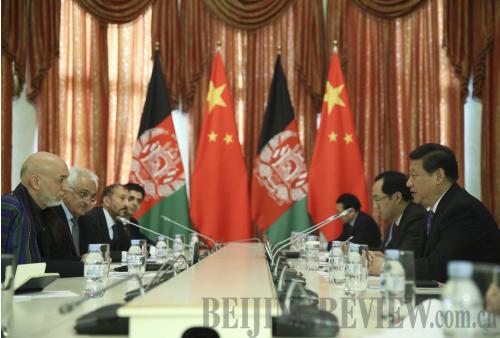|
 |
|
CONSULTATION: Chinese President Xi Jinping meets with Afghan President Hamid Karzai on February 7 in Sochi, Russia (LAN HONGGUANG) |

With the impending large-scale withdrawal of NATO forces led by the United States in 2014, Afghanistan will usher in a vital turning point for its transition. The U.S.-Afghanistan Bilateral Security Agreement, the upcoming Afghan general election as well as the national reconciliation of Afghanistan will have a heavy influence on the country's future transition.
The destiny of Afghanistan will be more closely tied with regional countries. As a neighbor of the Central Asian country, China hopes Afghanistan can manage the transition smoothly and is poised to play an important role in Afghanistan's reconstruction.
Key factors
Thus far, Washington and Kabul are still betting on the bilateral security pact. As the pact concerns the independence and sovereignty of Afghanistan and the future position of the United States in the country, negotiations often came to a deadlock with major divergences between both sides. The immunity of U.S. soldiers and the right to search Afghan homes were the main points of contention. Though the two countries reached an initial agreement on the draft of the pact, which was approved by the Afghan parliament last November, Afghan President Hamid Karzai delayed the signing of the bill. Washington then threatened to withdraw all troops and terminate aid to Afghanistan.
For Karzai, while he wants more rights and interests for Afghanistan, he is also afraid to be mislabeled as having signed a traitorous treaty in the future. Therefore, it is unlikely that Washington and Kabul can improve their relations within the last months of Karzai's tenure. Washington must then pin its hopes on the next president, but if it withdraws all troops, the turmoil in Afghanistan will escalate.
The troubled Central Asian country will hold its third general election since the fall of the Taliban regime in April with 11 candidates fighting for the presidency. Different political forces within the country are currently staging fierce competition. In addition to the security threat from the Taliban, Afghan people are concerned about election fairness and transparency given widespread fraud allegations in the 2009 election. If the election result fails to be recognized by most Afghan people, it could spark more civil unrest.
In the meantime, along with the U.S. troop withdrawal, Afghan security forces and police will assume the public security tasks of the nation independently. Whether they are capable of safeguarding the country's security will be tested by counterattacks from the Taliban. Although NATO forces have weakened the Taliban in the last decade, its destructive effects on Afghanistan's reconstruction cannot be underestimated. Currently, violent attacks from the Taliban have not decreased. Major facilities in Kabul and U.S. military bases are still the main targets of Taliban attacks.
Hardliners of the Taliban in Afghanistan anticipate a "security vacuum" following the withdrawal of U.S. troops, while Taliban moderates prefer to negotiate with Kabul in a bid to seek greater political space in the country. Though Karzai has offered the Taliban an olive branch for peace talks more than once, complicated disagreements among the United States, the Afghan Government and the Taliban are difficult to reconcile. Peace talks are often met with repeated setbacks. Political reconciliation is urgently needed in Afghanistan, and it is essential to lasting peace and stability for the country.
Even though Afghanistan is known as the "graveyard of empires," its geo-strategic value attracts many powers to extend their influence in the country. For the United States, the Barack Obama administration hopes on the one hand to end the war as soon as possible in order to focus on its "pivot to Asia" strategy; on the other hand, Washington doesn't want to give up its achievements in Central Asian countries in fighting terrorism and wishes to maintain a strategic fulcrum in Central Asia.
Meanwhile, Russia regards Central Asia as its traditional sphere of influence. As terrorism spreads to the north, drug smuggling becomes rampant, and the United States squeezes its sphere of influence in Central Asia, Russia is against the long-term stationing of U.S. troops in Afghanistan. Russia has also enhanced its own military presence in Central Asian countries in recent years.
| 